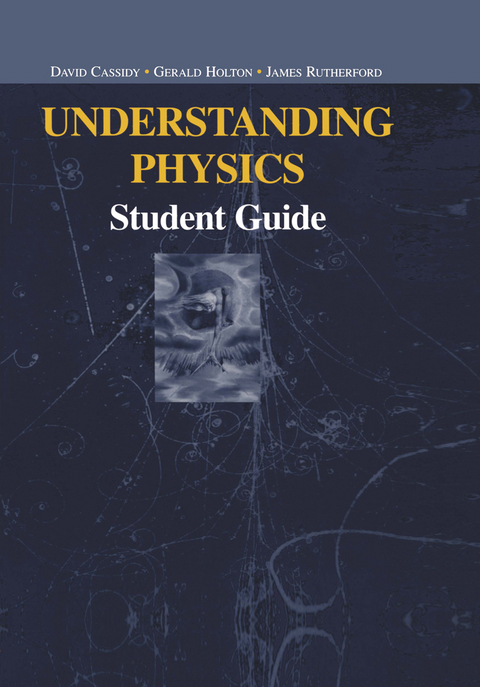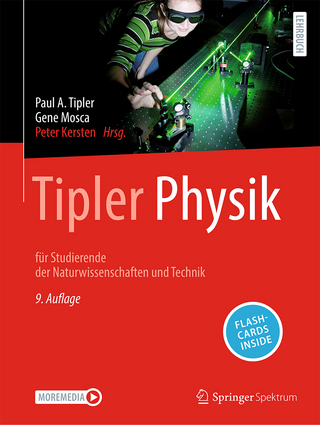
Understanding Physics
Student Guide
Seiten
2002
Springer-Verlag New York Inc.
978-0-387-98755-2 (ISBN)
Springer-Verlag New York Inc.
978-0-387-98755-2 (ISBN)
This book, a companion to the textbook, Understanding Physics, is your guide to observations and explorations in the world of physics. Each - ploration is keyed to specific portions of the textbook, and lists are also provided of the explorations pertaining to each part of the text.
This book, a companion to the textbook, Understanding Physics, is your guide to observations and explorations in the world of physics. Prepare for ch- lenging work, fun, and some surprises. One of the best ways to learn physics is by doing physics, in the laboratory and everywhere. One cannot rely on reading and class work alone. The explorations in this book are your - portunity to gain some actual, hands-on experience with physics. Many of these explorations will assist you to design your own experiments and to discover many of the important ideas of science yourself. As you will see from the Contents, this Student Guide provides a variety of potentially helpful materials. Following the Introduction is a review of units, mathematics, and scientific notation, and a list of suggested further reading and Web Sites. However, a large portion of the Student Guide c- tains further materials relating to many of the textbook chapters, as well as to laboratory explorations. In the section containing “Further Chapter - terials” you will find elaborations on topics in many of the chapters, as well as derivations of important equations. A complete list of the suggested mi- and major-laboratory explorations is also given in the Contents. Each - ploration is keyed to specific portions of the textbook, and lists are also provided of the explorations pertaining to each part of the text.
This book, a companion to the textbook, Understanding Physics, is your guide to observations and explorations in the world of physics. Prepare for ch- lenging work, fun, and some surprises. One of the best ways to learn physics is by doing physics, in the laboratory and everywhere. One cannot rely on reading and class work alone. The explorations in this book are your - portunity to gain some actual, hands-on experience with physics. Many of these explorations will assist you to design your own experiments and to discover many of the important ideas of science yourself. As you will see from the Contents, this Student Guide provides a variety of potentially helpful materials. Following the Introduction is a review of units, mathematics, and scientific notation, and a list of suggested further reading and Web Sites. However, a large portion of the Student Guide c- tains further materials relating to many of the textbook chapters, as well as to laboratory explorations. In the section containing “Further Chapter - terials” you will find elaborations on topics in many of the chapters, as well as derivations of important equations. A complete list of the suggested mi- and major-laboratory explorations is also given in the Contents. Each - ploration is keyed to specific portions of the textbook, and lists are also provided of the explorations pertaining to each part of the text.
A Word to Future and Current Teachers.- Reviewing Units, Mathematics, and Scientific Notation.- Further Reading and Web Sites.- Some Further Chapter Materials.- Laboratory Explorations.
| Reihe/Serie | Undergraduate Texts in Contemporary Physics |
|---|---|
| Zusatzinfo | XII, 165 p. |
| Verlagsort | New York, NY |
| Sprache | englisch |
| Maße | 178 x 235 mm |
| Themenwelt | Naturwissenschaften ► Physik / Astronomie ► Allgemeines / Lexika |
| ISBN-10 | 0-387-98755-X / 038798755X |
| ISBN-13 | 978-0-387-98755-2 / 9780387987552 |
| Zustand | Neuware |
| Haben Sie eine Frage zum Produkt? |
Mehr entdecken
aus dem Bereich
aus dem Bereich
Band 1: Mechanik und Thermodynamik
Buch | Softcover (2022)
Wiley-VCH (Verlag)
CHF 55,85
für Studierende der Naturwissenschaften und Technik
Buch | Hardcover (2024)
Springer Spektrum (Verlag)
CHF 109,95


